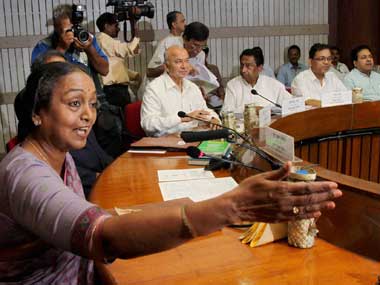Eight years after the Right to Information (RTI) Act was passed, the landmark legislation continues to face threats from the very political class which enacted it. Experts say that the cabinet decision to keep political parties out of the ambit of the transparency law is just the latest attempt by the political class to circumvent the Act. If passed in the Parliament, the amendments to exclude parties will render ineffective the 3 June ruling of the Central Information Commission (CIC) which brought political parties under the purview of the RTI Act. The six national parties- BJP, Congress, NCP, BSP, CPI, CPI (M) - are substantially funded by the government and have been declared public authorities as per the definition in the act, the CIC ruled. The political parties unanimously opposed the move, and are now using parliamentary legislation to sidestep the CIC. “The journey of the RTI Act shows that the efforts by the union government to bring restrictions to the Act are lot more than the ones aimed at increasing transparency. Even after eight years of the passage of the law, considered one of the best in the world, the government has not internalised the philosophy of openness,” said Venkatesh Nayak, programme coordinator of the Commonwealth Human Rights Initiative’s Access to Information Programme. [caption id=“attachment_1016313” align=“alignleft” width=“380”]  At the recent all party meet the political parties agreed to amend the RTI. PTI[/caption] The first serious attempt to weaken the Act came in 2006, a year after the union government notified the act. As per the 2006 draft amendments, only the file notings- note sheets attached to the files containing discussions on the subject/ matter- related to social and development issues would be made available to the RTI applicants. Social activist and then member of the National Advisory Council, Aruna Roy, successfully lead the movement to resist the draft amendments. In 2010, the department of personnel and training, nodal body for implementing the Act in the country, proposed amendments that would restrict each application to 250 words, and allow it to raise queries related to only one subject matter. Civil society stonewalled the proposal terming it ‘absurd’ and against ‘regressive.’ But a year later, the legislation faced a severe blow when the cabinet decided to exempt the central bureau of investigation from giving information under its ambit. Another challenge is the backlog of pending appeals and complaints at information commissions – central and state – which is also obstructing the RTI Act. The annual CIC report 2011- 2012 noted that “the percentage of disposal has gone down during 2011-12 in comparison to the same during the preceding year on account of two reasons viz. sharp increase in the number of appeals/complaints filed and registered in the Commission as well as lesser number of Information Commissioners as compared to 2010-11.” Different interpretations of the Act by state authorities have also done its share to hamper the flow of information under the law. For example, Karnataka has implemented a 150 word limit on applications. The application fee in the Gujarat High Court is Rs 50 (only cash). The fee is Rs 500 if the required information pertains to tenders. The application fee in courts in Allahabad and Sikkim is Rs 500 as against Rs 10 prescribed in the central Act. Yet, by and large, RTI activists believe that the law remains as valuable as ever. In fact, the fact that the political parties came together to oppose the move to bring them under the Act is proof of its power, they say. Professor Jagdeep Chhokar, member, Association for Democratic Reforms said that every legislation goes through various stages of evolution before achieving maturity. “It takes 10- 15 years for a law to evolve. The RTI Act is still in its evolutionary stage. The real picture will emerge only once it is stabilised,” he said. Despite the attempts to curtail the Act, it has turned citizens into activists. While thousands of them come out on the streets in support of the Act, others continue to use the Act in rural areas, away from media glare. The sheer number of citizens obtaining information through the Act shows that it is too early to write it off. “Last year, over two million applications were filed with various public authorities across the country. More than 50 per cent of the applicants got the information they sough, which means around a million people getting information. You cannot dismiss such a huge number,” said Shekhar Singh of National Campaign for People Right to Information (NCPRI), a group which spearheaded the movement for passage of the Act. NCPRI member and social activist, Aruna Roy, says that the future of the Act is secure because of the passion of its supporters. “People now have a militia sort of approach as far as saving the Act is concerned. In the last eight years, they have realised how powerful they can become when they have information with them,” she said.
Eight years after the Right to Information (RTI) Act was passed, the landmark legislation continues to face threats from the very political class which enacted it.
Advertisement
End of Article


)
)
)
)
)
)
)
)
)



